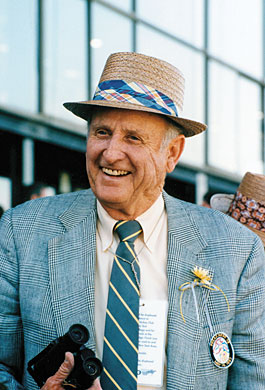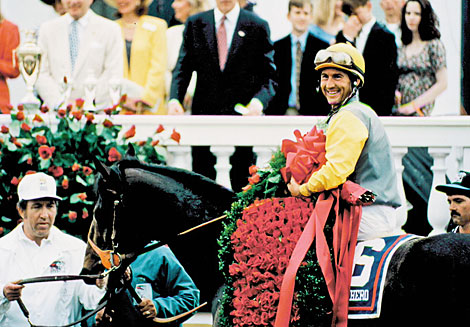The charm of horse racing lies primarily in the animals that do
it—their beauty, grace, power and their degree of class. But there is an
undeniable attraction to the colorful human beings that make it happen.
The purpose of this blog is to share my stories about some of these
characters. My requisites in the selection: I had dealings with them,
their antics and accomplishments should not be forgotten, aand that at least most of them are
no longer with us. — Cot Campbell
A contest to determine the most
popular man in the history of Thoroughbred racing would surely find Mack
Miller's name in the finals. And 2 to 1 to win it! Quite an accomplishment,
because, while he was certainly not born with a silver spoon in his mouth, he
ended up with a mouth full of silver ladle. Because he served as private
trainer (and close friend) for two of the richest men in the world, and two of
the most appreciative and understanding when it came to the vagaries of racing.
They were Charles Engelhard, the platinum king, and then Paul Mellon, the
renowned sportsman and philanthropist.
So, Mack might have had a
target on his back. But because he was such a nice guy, and his ability was so
respected, no one ever took a shot at him. You never heard him criticized, and
that spoke volumes about the man. He reeked of quality. Interesting that he was
the one American horse trainer that any other horse trainer would go to for
advice and not feel that they had compromised their own expertise. He was what
Dr.Larry Bramlage is today in the veterinary field.
Mack Miller was the quintessence
of success and quality in Thoroughbred racing. He was a tall, handsome fellow,
great smile, cheery way about him, always nicely turned out in Brooks Brothers
garb. Sociable to friends, fans and associates, but around his barn he saw to
it that things were popping, and popping in the direction that he wanted. Ask
former assistants like Neil Howard, Pete Vestal, Danny Furr, Mike Cline, Jeff Minton
and other impressive names.

Mack Miller
Sometimes in one's career it
seems a matter of supreme importance for some big shot to speak to you and call
you by your name. You need to feel that you have arrived, or are about to.
Hearing "Hi Cot" from Mack one day was big stuff to me in the mid-seventies.
Another time at Saratoga, I was thrilled when he asked me to clock a horse for
him.
Mack came from a small-town,
Norman Rockwell-type family. His father was superintendent of motor vehicles in
Versailles, Ky. His mother was a saintly lady who sang in the choir at
the Presbyterian Church. Mack was fond of proclaiming, "My mother could sing
like a bird." That same Presbyterian Church delivered a rousing, standing
ovation when Mack and Martha Miller strode down the aisle to the Miller pew on
Sunday morning after his Sea Hero had won the Kentucky Derby.

Sea Hero
Miller grew up under rigid rules
about what was right and wrong, and he played by them all his life. And he did
not dig
—
or condone
— anyone who didn't. He shunned for a time a couple of super
popular riders who were suspected of chicanery. He adored Jerry Bailey
("He had the finest countenance, the nicest outlook"), but he fired him when it
became apparent that during a period in mid-career Jerry was laying on the
sauce a bit strong (Jerry later fixed that problem for good, and Mack got him
back).
Mack Miller's middle name was
integrity. He led the league in self deprecation...and hypochondria, by the way.
He was truly a world-class, charming companion, but he would regale you with
maladies or diseases he was coming down with, or sing the blues about the poor
condition of his stock
—
"not a horse in the barn can run a lick."
Mack's first experience with
horse racing was leading broodmares out to pasture at Calumet. He was a lean,
lanky six-foot-three, and tipped the scale at all of 130 pounds. He looked like
a plucked chicken. So between lack of experience and heft, the mares really
dragged Mack to the paddocks. He held on though, gained experience, and before
long, through his hometown connections, was able to take a few horses to the
race track for some, good-old-boy, "hardboot" breeders in Central Kentucky. He
carved out a solid reputation for horsemanship and honesty in the process.
Then, by God, he developed a champion (Leallah)! And
—
as horses can do
—
she
helped put him in the big time.
He was offered a delicious draft
of horses to train for a new man in the game
—
Charles Engelhard. This big
opportunity sputtered off to a dismal start, much to Mack's anguish. Typically,
Mack, with the string at Belmont at the time, and embarrassed about their
accomplishments, called up Mr. Engelhard, asked if he could come to his home in
New Jersey to talk with him. When they met, Mack told his client he was doing
such a terrible job that it was only right that he resign. Engelhard, no dummy
when it came to judging people, said, "No, you're not going to resign. Instead,
you're going to train all my horses. You're my private trainer. You're on the
payroll from here on in." Mack gulped, said OK, went back to Belmont, and soon
the fog lifted. The stable began to sizzle, one good horse after another.
Charlie Engelhard died after some
years of that association. Mack trained for his widow for awhile, and then the
job with Paul Mellon opened up. Mellon had decided to split up with his
longtime trainer Elliott Burch. This presented a painful, sensitive situation,
as Elliott and Mack were best friends, but Elliott was going, one way or
another, so Miller took over one of the most prestigious jobs in racing. And he
never looked back. Sea Hero, Fit to Fight, Java Gold, Assagai,
Tentam, Halo, and on and on. Dangerous to start naming his big horses, because
he trained a gang of them.
Being an old-time guy with
old-time ways, he brought his stock into Aiken, S.C., to winter
quarters. So, Mack really had three homes: Versailles, Garden City, N.Y., and
Aiken. He wintered in Aiken in a home and considerable acreage given to him by
the grateful patron Charlie Engelhard.
He toiled in Aiken with such
racing luminaries as John Gaver, Mike Freeman, Buddy Raines, Frank Wright,
Woody Stephens, Angel Penna, Jim Maloney and many others of the same ilk. He
adored Aiken. He loved playing golf, which he did almost every afternoon.
In the heyday of Aiken, the
training of racehorses was ruled by the greatly revered, no-nonsense Greentree
trainer, John Gaver. Mack Miller became a luminary of unexcelled luster
eventually, but was not in the early days. He learned from the
Princeton-educated Gaver, was greatly influenced by him, and stood in awe of
him. He was anxious not to displease him.
One winter Mack was training
Halo, an outstanding grass horse. Halo, during his racing days and later at
stud, was one surly, disagreeable, rough customer. He gave Mack many a gray
hair. Halo took great pleasure each day, when sent out in one of the large sets
of trainees, in dumping his rider. He would then gallop around the track
several times. His exuberance gratified, he would conclude his adventures by crossing
Two Notch Road, plowing into the Greentree training complex, where he would
attempt to breed each and every horse being cooled out on their walking ring.
This intrusion into the Greentree compound was quite disruptive, and annoyingly
repetitive, Gaver felt. One day, after such an episode, Gaver ran into Mack
down at the clockers' stand and said, "Mack, you're going to have to take care
of that son of a bitch! Or I'm going to
castrate him! Since Halo became one of the best sires of his days, it is fortunate
for the breed that Mack was able to control Halo's unscheduled trips to
Greentree.
Mack Miller was certainly a
creature of habit, and his habits did not include late hours. If Kentucky was
not scheduled to play basketball on TV, he would organize dinner with pals.
This would begin at 6:30 p.m., involved two martinis, and around 8:30 p.m. Mack was
looking for the party to break up.
Mack took enormous pride in
cooking cheese straws. Around Dec. 1, the cheese straw program would be
heavy on Mack's mind, so there would be an ample supply for all his pals at
Christmas. When invited to his house, one had access to cheese straws until you
choked. For the drinkers, these were washed down with martinis "mixed to Paul's
(Mellon, that is) recipe."
When he and Paul Mellon
retired
—
and the two events were definitely associated
—
Mack and his splendid
wife, Martha, moved back to their family roots in Versailles, and he fell into a
quiet life on Morgan Street. He would make an occasional foray over to
Keeneland for the races or the sales, but not much of that.
MacKenzie Miller
—
truly "one of
the ones."
(Editor's Note: A previous version of this story included De La Rose among the horses Miller trained. The grade I winner was trained by Woody Stevens but bred by Miller in partnership with Dr. and Mrs. R. Smiser West.)
More of Cot Campbell's stories are included, among a host of others, in The Best of Talkin' Horses.




